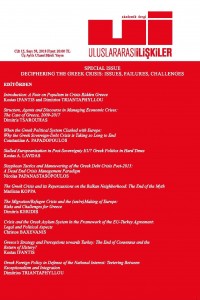Abstract
This article focuses on the discursive frames used by policy entrepreneurs in Greece as they attempted to deal with the 2009 crisis and analyses the role played by discourse in handling the crisis’ consequences. Adopting a historical institutionalist framework, I argue that ineffective policy outcomes can be attributed to a pathdependent logic enshrined in the country’s political economy structures following the transition to democracy post-1974. Moreover, the reaction of policy entrepreneurs to the crisis was reinforced by their discursive logic of action, itself embedded in the state’s institutional matrix. Procrastination, a refusal to face an uncomfortable reality and politics as usual colours the response of Greek actors to the country’s biggest crisis in recent memory.
References
- .......
Abstract
Yunanistan’da siyasetçilerin, 2009 kriziyle başa çıkmaya .alışırken kullandıkları söyleme odaklı bu makalede krizin sonuçları ele alınmakta ve söylemin oynadığı rol analiz edilmektedir. Tarihsel bir kurumsal çerçeve benimseyen yazarın temel savunusu, etkisiz politika sonuçlarının ülkenin 1974 sonrasında demokrasiye geçiş sonrasında yaşadığı siyasi ve ekonomik yapıda yer alan mantıkla ilişkilendirilebilir olduğudur. Politika girişimcilerinin krize tepkileri, devletin kurumsal matrisinin içine gömülü olan söylemsel eylem mantığıyla güçlendirilmiştir. Erteleme, rahatsız edici gerçekle yüzleşme ve politikanın her zamanki durumu da aktörlerin hafızaları da son en büyük krize tepkilerini şekillendirmede belirleyici olmuştur.
References
- .......
Details
| Primary Language | English |
|---|---|
| Journal Section | Articles |
| Authors | |
| Publication Date | June 1, 2018 |
| Published in Issue | Year 2018 Special Issue: Deciphering the Greek Crisis: Issues, Failures, Challenges |


